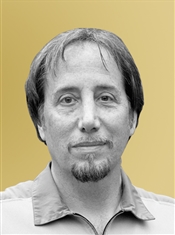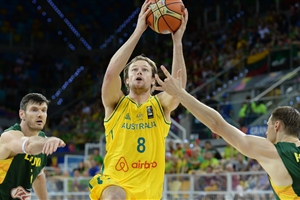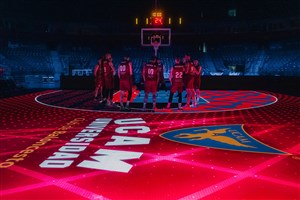
Basketball camp can teach more than a game
CHARLOTTE (Steve Goldberg's Wheel World) - Earlier this week, two-time Paralympian Darlene Hunter wrote via Facebook that she had just returned to Texas from Germany where she had traveled with the USA National Women's Team for a warm-up tournament in Frankfurt.
It was a good week for the Americans. They had won the World Super Cup in a field that included defending Paralympic champs Germany and bronze medalists Netherlands yet Hunter was more excited about the rest of the week, writing, "Tomorrow all the campers come in for Lady Mavericks Wheelchair Basketball Women's Development Camp. It is my favorite time of the year!"
And this exclamation comes from a player heading to Rio in a month and a half for the most important event in wheelchair basketball.

Darlene Hunter (5) on the court against Germany at the 2012 London Paralympic Games. Photo by Steve Goldberg/SCS Media
But I get it. As a relatively mediocre player in my high school days but good enough to make the team, practice was my favorite part because that's when I got to play. And what is basketball camp but a week of practice from morning to night. For me, it didn't get better than that.
To paraphrase the FIBA motto, come summer (or winter south of the equator), "Basketball camps are everywhere". There are thousands of them around the world but two that ran this week stand out for me.
"The reason I love this camp so much," says Hunter, "is that it is all about developing the future of women's (wheelchair) basketball. It is the only camp like this in the nation and it is completely free to the girls once they get here."
“It’s great to mentor the new generation, and to see where we are moving. The sport never disappoints. ”
Which makes it similar to the Achievements Unlimited Basketball School that wraps up its 32nd year of teaching the game, and a bit extra, this week. Along with a t-shirt and a ball, every player gets a dictionary and a list of vocabulary words that they need to learn if they want to be eligible for camp awards and honors. The coaches work with them on this as much as any other skill. More than basketball is taught here.
The AU camp was started in 1985 by a 26 year old former college player and assistant coach who was then just weeks away from starting his first year in law school. There was something he had to do first though.
Long before he would work for top sports agency F.A.M.E., and Nike, and Brand Jordan; long before becoming the president and chief operating officer of the NBA Charlotte Hornets, Fred Whitfield was a kid who went to basketball camp.

Before he was sitting with NBA leaders like Adam Silver and David Stern as president of the Charlotte Hornets, Fred Whitfield was a star player at Campbell University. Photos Courtesy of Campbell University

He grew up comfortably in a lower middle class neighborhood but most all of his teammates at the Windsor Community Center gym came from the low income projects not far away. Basketball camp was a luxury their families could not afford.
"They were all my friends. We'd play basketball in the winter and Little League baseball in the spring and summer."
While we sat on bleachers watching the kids run drills one day and stood outside as the HoopTee Charities celebrity golf tournament he created to help benefit the camp got underway on another, Fred related to me how it all came to be.
As he moved from a successful and honored playing career at Campbell University, a small school in the shadow of UNC, NC State and Duke in nearby Buies Creek, NC, and time on the bench there as an assistant coach while he gained his MBA in graduate school, Whitfield wasn't thinking about the work ahead in law school but of the many friends from the community center team who hadn't even survived to this point, let alone succeeded.
Too many were dead or debilitated from drugs or the violence that came with it, or otherwise lost from dropping out of school.
While his athletic and academic skills – his mother was a teacher – along with the work ethic ingrained from his parents took him away from Greensboro, he wasn't able to stay as close with those who didn't get away.
"By the time I got to 25, I looked around and half of my teammates were dead from some sort of drug related activity.
So he created a camp with a mission bigger than basketball.
"I had gone to summer camps since I was 9 years old and I knew I wanted to hold one here (in Greensboro)," Whitfield told the Greensboro News & Record in 1986 just before the second AU camp began. "I also knew that I wanted to emphasize education."
From day one, he prioritized the fundamentals of learning alongside the fundamentals of basketball. Featured speakers at the camp would talk not just shooting skills but study skills. More than just an all-star list of basketball players and coaches, speakers have been NFL players and network announcers, police officers and musicians, NASCAR drivers and substance abuse specialists.
It helped that, even at 26, Whitfield could call in a few favors from friends to help launch the camp and talk to the kids. One of them had been a teenage camper he instructed when he was a counselor at the same Campbell Basketball School that Whitfield went to every summer.

The Campbell University Basketball School was the first one in America when it began in 1956. Besides Michael Jordan, here returning as a guest speaker, another alumnus was "Pistol" Pete Maravich whose father Press Maravich, then the head coach at Clemson, worked the camp for over 20 years. Photo courtesy of Campbell University
That camper must have paid attention because he was now a 21 year old NBA player coming off his rookie of the year season. The previous summer, the former camper named Michael Jordan had represented his country at the Olympic Games in Los Angeles and would enter the FIBA Hall of Fame in 2015.
He wasn't alone. Whitfield also called in other friends in the game like Ralph Sampson, a three-time college player of the year at Virginia and the NBA rookie of the year before Jordan received the honor. Also on-board were then Duke stars Johnny Dawkins and David Henderson.

The strong anti-drug message in the camp curriculum was effectively linked at the second camp when former All-American, NBA, and USA player John Lucas spoke frankly on how cocaine ended his career.
The speakers this week started with a senior police officer talking with the kids about how to interact safely with law enforcement and included NFL star Michael Vick, who gave testimony on the ability to rebound and recover from making poor choices, as he had to do after going to jail for running an illegal dog-fighting operation.
Fred told me that Achievements Unlimited has expanded beyond Charlotte, where he moved the camp several years ago, by funding scholarships to other camps around the country, to ensure that AU and other basketball schools are accessible to those kids most like the friends he lost. He noted that 75 percent of those at this camp in Charlotte were on partial or full grants to attend.
That same spirit lives in Texas as well where the women's development camp is held at the University of Texas-Arlington, whose women's program has coincidentally developed into the current national title holders.

A US National Team player since 2010, Darlene Hunter is also coach of the Jr. Dallas Wheelchair Mavericks. Photo courtesy of Darlene Hunter
"I really want the girls to see the future," says Hunter. "We have a lot who didn't get much time in the juniors because they were playing against boys and couldn't see how they fit in the women's college and women's (adult) divisions. We want them to see how very valuable they are to the women's sports."

"We have coaches from across the country that pay their way and donate their time as well because they believe in the mission so much," says Hunter. Some are closer, such as the Dallas Wheelchair Mavericks Bobby Nickleberry, the 2016 NWBT Championship Division MVP. Photo by Haley Hathcock
Like Whitfield, Hunter, make that Dr. Hunter, is a bit of an overachiever when it comes to education. She earned her PhD. in family studies in 2009 after getting her Master's Degree in social work in 2006.
And like Whitfield, it's about providing a look at what might be.
"We tell them that it is important to get good grades and work hard in school so that they can have a future in college. This camp being on a college campus lets them see the possibilities."
Possibilities. That's your vocabulary word for the day.
Steve Goldberg
FIBA
FIBA's columnists write on a wide range of topics relating to basketball that are of interest to them. The opinions they express are their own and in no way reflect those of FIBA.
FIBA takes no responsibility and gives no guarantees, warranties or representations, implied or otherwise, for the content or accuracy of the content and opinion expressed in the above article.
To help make this column as inclusive as possible, please send any national or international event information, story suggestions, or comments to wheelworldmail@gmail.com.

















